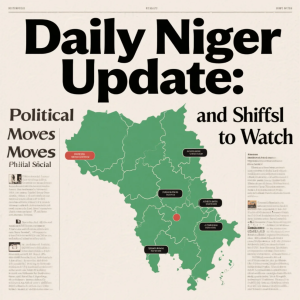Niger is undergoing a profound transformation.
After years of political uncertainty and external challenges, the country’s new wave of government reforms aims to strengthen institutions, restore public confidence, and redefine how power operates.
For millions of Nigeriens, these changes could signal the start of a new era in governance — one rooted in accountability, inclusivity, and national renewal.
🏛️ 1. Governance Reforms: Building Stronger Institutions
At the heart of Niger’s power shift are initiatives to decentralize authority and empower local governments.
By transferring decision-making closer to communities, the government seeks to enhance transparency and responsiveness.
These reforms also promote civic participation, allowing citizens to have a stronger voice in policies that affect their daily lives.
⚖️ 2. Anti-Corruption and Accountability Measures
Corruption has long hindered development in Niger.
New oversight mechanisms, digital transparency tools, and stronger judicial independence are designed to curb misuse of public funds and increase public trust.
For citizens, this could mean fairer access to resources and a more reliable system of governance.
💼 3. Economic Policy Adjustments
Niger’s economic reforms aim to reduce dependency on foreign aid and diversify the economy beyond mining and agriculture.
Initiatives promoting entrepreneurship, small business growth, and sustainable energy projects are reshaping local opportunities.
If implemented effectively, these policies could empower young workers and strengthen long-term financial independence.
🕊️ 4. Civic Freedoms and Social Inclusion
Alongside economic and political changes, the government has pledged to protect freedom of expression and press rights.
Civil society groups and youth organizations are playing a growing role in shaping dialogue on governance and reform.
This marks a step toward inclusive democracy where citizen participation drives policy direction.
🌍 5. Regional and International Implications
Niger’s reforms also carry significance for the broader Sahel region, where political instability remains a major concern.
A stable, reform-driven Niger could serve as a model for governance renewal, helping foster cooperation and security across borders.
International partners are watching closely, with many offering technical and financial support to sustain progress.
🌱 6. What It Means for Ordinary Citizens
For everyday Nigeriens, these reforms bring cautious optimism.
Better local governance, economic diversification, and anti-corruption initiatives may gradually improve public services, job opportunities, and trust in the state.
The success of these efforts will depend on consistency, transparency, and citizen engagement in holding leaders accountable.
🏁 Conclusion: A Defining Chapter in Niger’s Journey
Niger’s ongoing power shift represents more than just political restructuring — it’s a chance to redefine the relationship between the government and its people.
If reforms stay on course, they could pave the way for lasting stability, inclusive growth, and democratic resilience.
For citizens, this is a pivotal moment to shape the nation’s path forward — together.




